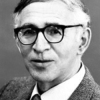Aaron Klug

Aaron Klug
Sir Aaron Klug OM PRSis a Lithuanian-born British chemist and biophysicist, and winner of the 1982 Nobel Prize in Chemistry for his development of crystallographic electron microscopy and his structural elucidation of biologically important nucleic acid-protein complexes...
NationalityBritish
ProfessionScientist
Date of Birth11 August 1926
keeps
I like teaching and the contact with young minds keeps one on one's toes.
basic field immediate increase nor produce seeks understanding
This field is not necessarily glamorous, nor does it often produce immediate results, but it seeks to increase our basic understanding of living processes.
actively add course involved perhaps
However, I should perhaps add that during the 20 years I have been back in Cambridge, I have been actively involved in the teaching of undergraduates, as well as of course supervising research students.
born family followed members settled soon turn
Shortly after I was born he emigrated to Durban, where members of my mother's family had settled at the turn of the century, and the rest of the family followed soon thereafter.
achieve carry investment large moderately periods pressure quick requires technology term time work
The work requires a moderately large investment in technological and theoretical developments and long periods of time to carry them out, without the pressure to achieve quick or short term results.
analyse carbon course fit oxygen rate
In the course of my stay there, I also showed how one could analyse the experimental kinetic curves for the reaction of haemoglobin with carbon dioxide or oxygen by simulations in the computer, and so fit the rate constants.
biological decided interested work
This work made me more and more interested in biological matter, and I decided that I really wanted to work on the X-ray analysis of biological molecules.
people sometimes nobel
People who get Nobel prizes aren't necessarily the most imaginative of people. People who sometimes find a system, develop a system, do very useful work.
latin philosophy school
The philosophy of the school was quite simple - the bright boys specialised in Latin, the not so bright in science and the rest managed with geography or the like.
father men facts
My father was trained as a saddler, but in fact as a young man worked in his father's business of rearing and selling cattle, so he grew up in the countryside.
powerful struggle secret
Human curiosity, the urge to know, is a powerful force and is perhaps the best secret weapon of all in the struggle to unravel the workings of the natural world.
strong interesting feels
I did not feel a particularly strong call to any one subject, but read voraciously and widely and began to find science interesting.
teaching responsibility years
I like teaching and the contact with young minds keeps one on one's toes, but increasing responsibilities have forced me to shed much of it in recent years.
dominion goes-on physics
Cambridge was the place for someone from the Colonies or the Dominions to go on to, and it was to the Cavendish Laboratory that one went to do physics.